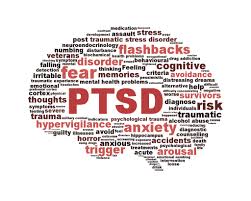What is PTSD

Post Traumatic Stress Disorder (PTSD) is a mental health diagnosis in the Diagnostic and Statistical Manual (DSM) used in the United States and the International Classification of Diseases (ICD). The definition of PTSD has been a topic of debate within the mental health community and has changed over the last few decades. Additionally, the current DSM-V and the soon to be released ICD-11 have taken different approaches in defining PTSD.
Where there is agreement and consistency...
- The definition of trauma - exposure to an extreme stressor involving direct personal experience of an event that involves actual or threatened death, serious injury, or threat to one's physical integrity; or witnessing an event that involves death, injury, or a threat to the physical integrity of another person; or learning that a traumatic event occurred to a close family member or friend.
- Symptoms have been present for more than 1 month and cause significant distress or impairment in social, occupational, or other important areas of functioning. Symptoms must include:
- Intrusion
- Recurrent, involuntary, intrusive, distressing memories of the event
- Recurrent, distressing dreams related to the event
- Flashbacks
- Distressed emotional or physiological reactions when exposed to reminders of the event (triggers)
- Avoidance
- Efforts to avoid distressing memories, thoughts, or feelings about the traumatic event
- Efforts to avoid reminders that arouse distressing memories, thoughts, or feelings about the traumatic event
- Increased Arousal or Sense of Threat
- Irritability or outbursts of anger
- Hypervigilance
- Difficulty falling or staying asleep
- Difficulty concentrating
- Exaggerated startle response
- Intrusion
The DSM-V has added the following:
- Negative alterations in cognitions and mood associated with the traumatic event
- Inability to remember important aspects of the event
- Persistent and exaggerated negative beliefs or expectations about oneself, others, or the world
- Persistent, distorted, cognitions about the cause or consequences of the event that lead the individual to blame themselves or others
- Persistent negative emotional state
- Markedly diminished interest or participation in significant activities
- Feelings of detachment or estrangement from others
- Persistent inability to experience positive emotions
- A specifier of "with dissociative symptoms" that includes "depersonalization" and "derealization."